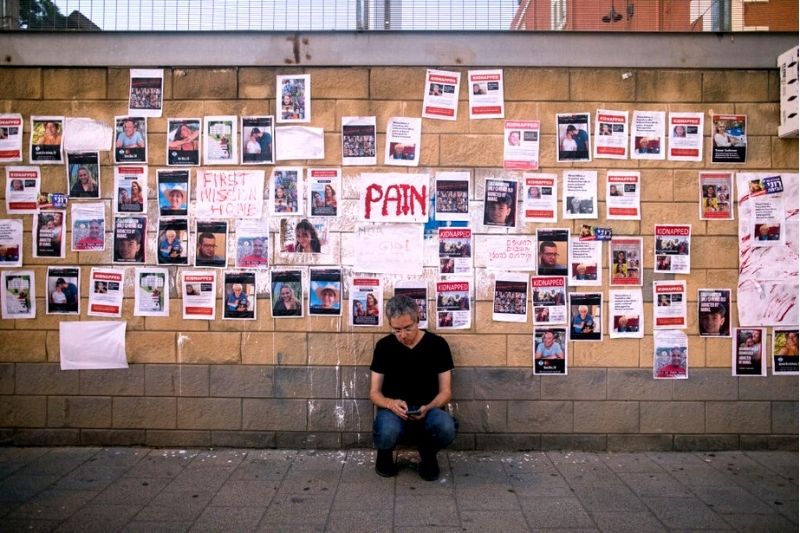When flesh becomes object, life dies twice.
In war, this is the necessary driver of action and survival. Kill or be killed. Do not think. Do not imagine the enemy outside war. Do not try to conjure the life outside the killing field.
One is trained. One is trained upon. It’s war. It’s not murder, for this is outside civilian life. But in war there is collateral damage, and the collateral damage is the death of non-combatants. Mistakes are made, a bomb is dropped on the wrong target, for instance.

War does not need to be officially declared. At a music festival in Israel death was visited upon more than 250 people. It was brutal, savage and sudden. It was a massacre. The festival was five kilometres from Gaza. Slaughter came in the form of Hamas terrorists, who also swept through streets and homes killing the defenceless.
At the same time, thousands of rockets were fired into Israel, thus beginning the return of rockets into Gaza from Israel. However precisely targeted, rockets carry in their destruction the loss of life with no connection to the trigger but that the dead were simply there. Men, women and children. Simply being there, on both sides of the border. Thousands are now dead.
How long is a piece of a string in this slaughter? What calculus to use? Indeed, is there an original death from whence this flower of death bloomed? So much blood and bone, so much. You can trace the arc of time’s arrow, run your eyes over history’s timeline, and mark the moments, look here hope rose for peace, and here it died. Over and over.
This is the river we try to cross. And so often we are seen to be not waving but drowning.
As surely as humanity is evolving with technological and medical advancements, at base, the moral foundations of civilisation are still built on sand.
'Most people of sympathy and empathy would believe there is an invisible thread that binds humanity. To think otherwise, to paraphrase legendary British jurist Lord Denning, is to consider a panorama too awful to contemplate, that is, what if a life is just mere object to another?'
If this were not true, then there would be no weapons of destruction. The more than 12,000 nuclear warheads globally, hundreds of times more powerful than those that destroyed Hiroshima and Nagasaki, would be no more; nations would not spend billions on submarines, and the more than $2 trillion on global defence budgets would be used for other purposes.
Give peace a chance? Sure.
But men are not angels. The better angels of our nature, as Abraham Lincoln evoked in his inaugural address in 1861, is a comforting image, and one writer Stephen Pinker used as the title of his book in which he argued violence and death by war was on a slow decline.
Lincoln was speaking to his countrymen to come together:
’We are not enemies, but friends. We must not be enemies. Though passion may have strained it must not break our bonds of affection. The mystic chords of memory, stretching from every battlefield and patriot grave to every living heart and hearthstone all over this broad land, will yet swell the chorus of the Union, when again touched, as surely they will be, by the better angels of our nature.’
He was assassinated four years later.
One hundred and fifty years on, humanity has evolved to a point where we have the United Nations, international humanitarian organisations, the Geneva Conventions, and we have the International Criminal Court, which investigates war crimes, genocide and crimes against humanity. In 20 years, 31 cases have been before the Court, resulting in 10 convictions.
From war, there are more than 100 million people displaced from their homes, 43 million of them are children, according to the UN refugee agency, the UNHCR. Two million kids have been born as refugees.
This is the collateral damage of war, and this is the blooding of a soul, perhaps towards the next conflict.
Most people of sympathy and empathy would believe there is an invisible thread that binds humanity. To think otherwise, to paraphrase legendary British jurist Lord Denning, is to consider a panorama too awful to contemplate, that is, what if a life is just mere object to another?
And there is another casualty: when the massacre becomes the norm, then does the world become numb to it? Comfortably numb. As Canadian songwriter Bruce Cockburn wrote, ‘the trouble with normal is it always gets worse’.
How can we comfort the children and the innocent of war with that?
Warwick McFadyen is an award-winning journalist. He has won two Walkley Awards and four Quill Awards. He has published several books of poetry. The latest is 21+4 Poems. His prose and poems have also appeared in Quadrant, Overland and Dissent.
Main image: A man sits near a wall with photos of hostages kidnapped and taken to Gaza in last Saturday's Hamas attack on October 17, 2023 in Tel Aviv, Israel. (Amir Levy/Getty images).